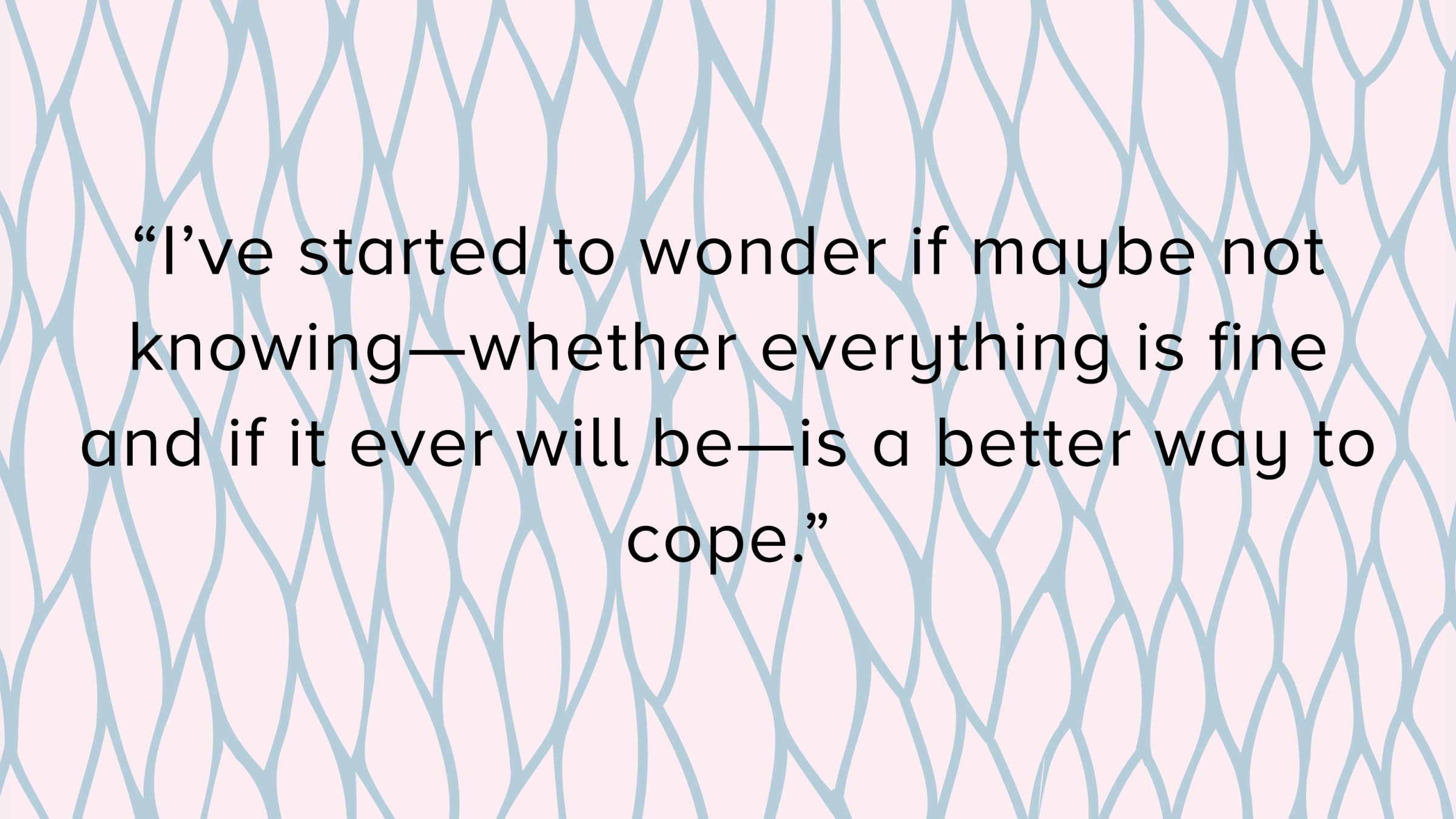
How are you adjusting?
What’s it like living in back in the U.S.?
Was it hard to come home?
People ask me these questions almost every day. And still, two years after I left my job as a Middle East correspondent for NPR, I don’t have good answers.
My usual, Midwestern answer—I’m from a small town in Illinois—is to say that everything is fine.
Everything is fine!
Coming home has been a breeze. I got a house near the ocean. I cooked, I swung in a hammock. Then I started working again. I discovered new and fascinating stories to cover here in the U.S. I got to spend more time with my husband and daughter.
That’s what I say, but I’m not exactly sure that everything is fine. And lately, I’ve started to wonder if maybe not knowing—whether everything is fine and if it ever will be—is a better way to cope.
***
Jump first, think later.
It’s a principle I have applied to all of the major events in my life. In the late ’90s, I had a great job at a newspaper and great friends in a great city—Chicago—but I wanted something more. So I jumped at a job at an English-language newspaper in Cambodia. That later led to a freelance gig with the BBC World Service and then NPR, based in Southeast Asia. By the time I realized I missed my old life, I was steamrolling through my new life.
Read more: How to Improve the Lives of Female Soldiers
Then, in 2010, NPR’s foreign editor called and asked me to lunch. He said he wanted me to go to Baghdad. I was standing outside NPR’s old headquarters when I realized I would have to accept. But I had a 1-year-old daughter. I called my husband, who was with her and some relatives in a nearby suburb. “Take it,” he said. “This is what you’ve been working toward for years.”
***
We didn’t really stop and think about that decision for a long time. The posting in Baghdad turned into covering the Arab Spring. It was the greatest story of our time…until it wasn’t. Massive uprisings led by millions of 20-year-olds across the Arab world turned into war in some places. I hit the road to report in Bahrain, Yemen and Syria. Then, my husband, daughter and I moved to Beirut. The Syrian conflict next door started spilling into our city. One night, tanks were actually parked on our doorstep.
When we finally sat down to think about what we were doing, it was the summer of 2013. My husband had applied for a teaching job in California. I didn’t really believe he would take it if he got it, but when he did get it, he said it was a good chance for us to make a change, to leave the Middle East and go back home to the U.S. We always jump, he told me.
***
But I put it off. My family went on summer vacation in the U.S. I took an assignment in Egypt and watched as yet another revolution unraveled. The thing is, I didn’t want to leave. I loved my job. I couldn’t imagine doing anything else. After Egypt, I spent weeks sitting in our Beirut apartment, paralyzed about what to do.
I don’t really remember the day I actually made the decision to leave. Maybe that means something. But I did make that choice, and we got that house by the ocean. I swung in the hammock and did the cooking. I made Middle Eastern dishes for weeks, obsessively turning out vats of eggplants and chickens and yogurt and things with pomegranate seeds on top that were way too much food for my family.
Read more: How to Cope at Work When Life Gets Hard
And then I started ocean swimming. A friend had suggested it years before. I’ve always been good at swimming. But I had no idea how to deal with the infinity of something like an ocean. Plus, I thought I needed something hard, that my new life was too comfortable.
I’d like to say all kinds of things about how the ocean humbled me, how it made me confront the larger forces of the Earth. But I’m not sure that’s true, either. What I do know is that I made it up to a mile last summer and that when I bodysurf into shore, walk out of the water and peel off my bathing cap, I don’t have to think. I just feel really alive.
I get questions about that, too. Why don’t you just swim in a pool? Aren’t you afraid? What about sharks?
And my answer is the same. I haven’t really thought about it much. I just jumped. And besides—if you keep your eyes closed, you don’t see the sharks.
Kelly McEvers is co-host of All Things Considered, NPR’s award-winning afternoon newsmagazine, and her new podcast, Embedded, launches March 31.
More Must-Reads From TIME
- The 100 Most Influential People of 2024
- The Revolution of Yulia Navalnaya
- 6 Compliments That Land Every Time
- What's the Deal With the Bitcoin Halving?
- If You're Dating Right Now , You're Brave: Column
- The AI That Could Heal a Divided Internet
- Fallout Is a Brilliant Model for the Future of Video Game Adaptations
- Want Weekly Recs on What to Watch, Read, and More? Sign Up for Worth Your Time
Contact us at letters@time.com